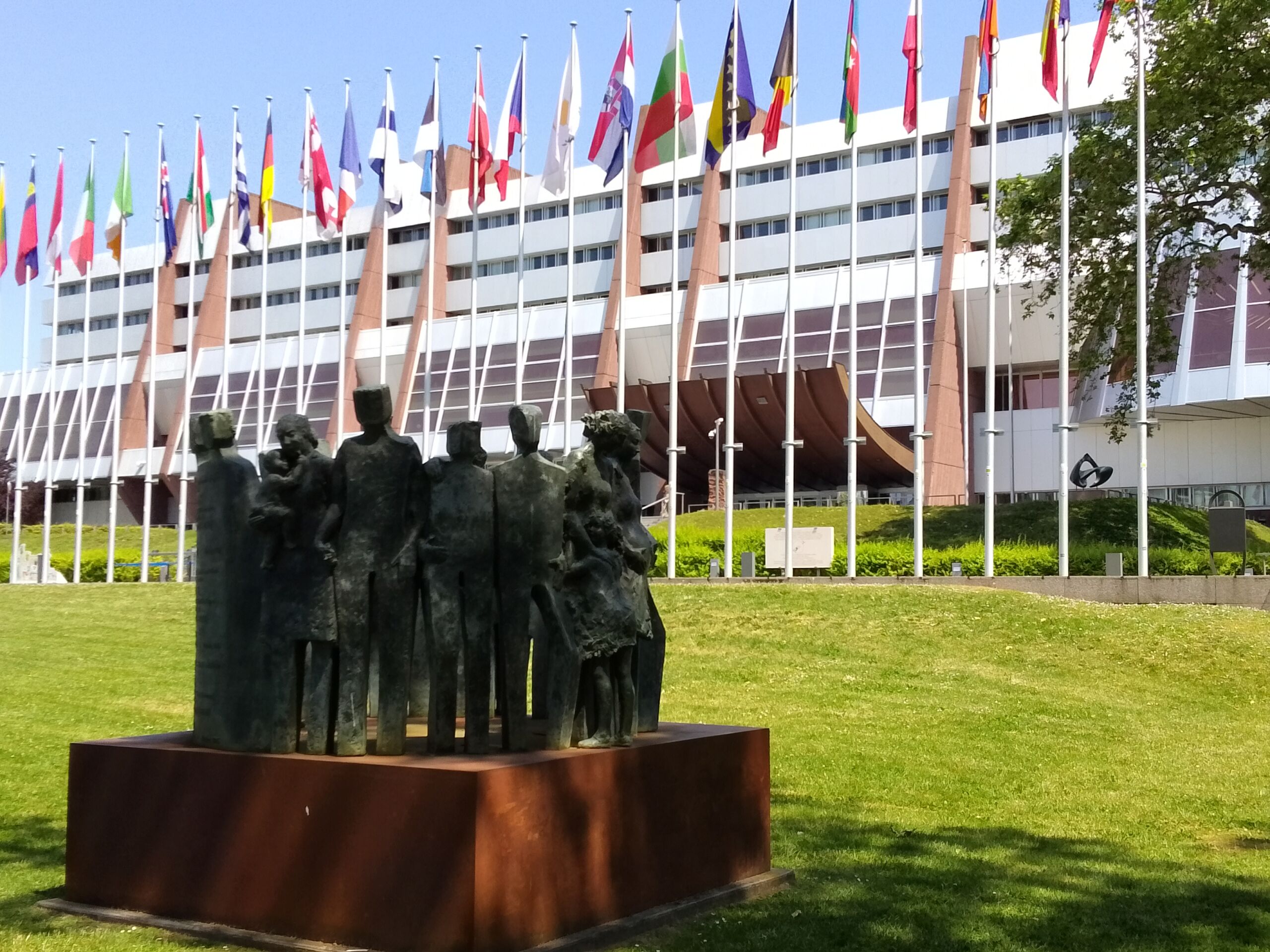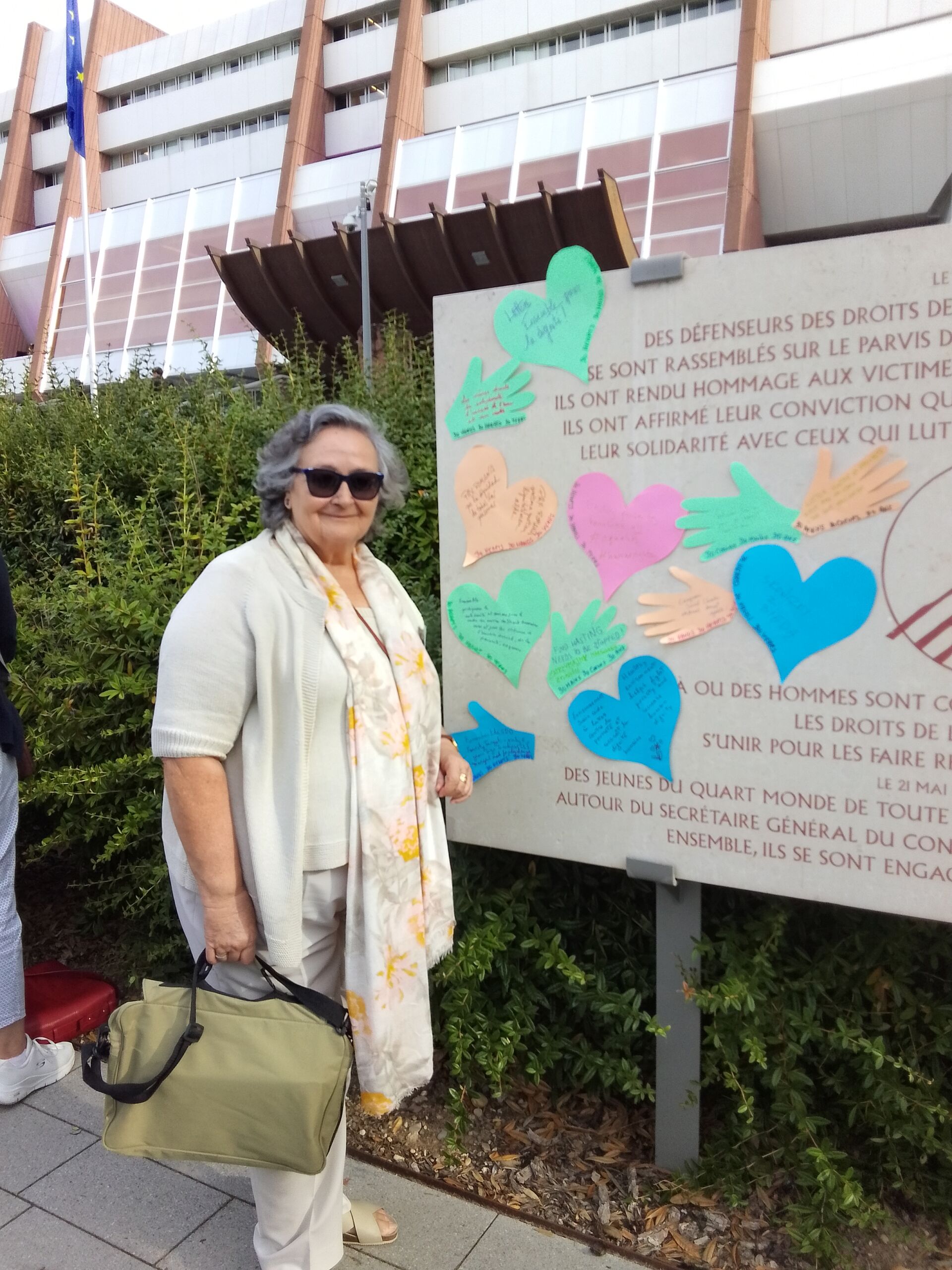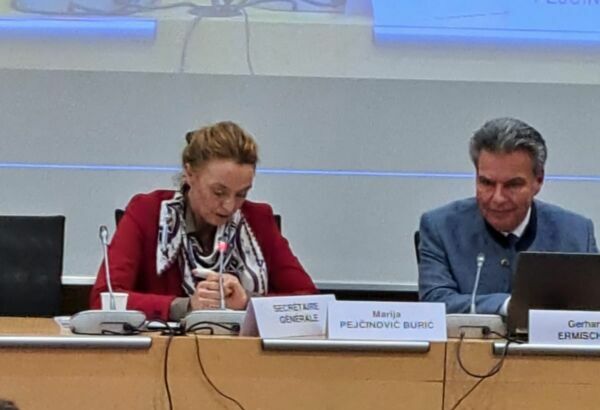2023 AUTUMN SESSION CONFERENCE OF NGOS OF THE COUNCIL OF EUROPE (CoE)
The Autumn Session of 2023 was held on October 9, 10 and 11; as always, in the “Agora” building in Strasbourg.
The reports and debates in this edition have been devoted mainly to operational issues. On the one hand, the Conference’s relations with the other bodies of the Council of Europe, in the light of the priorities defined in the Declaration of the Reykjavik Summit. And on the other hand, the internal workings of the Conference AA, in view of the new elections of the Presidency and Standing Committee that will take place next April, in the Spring Session 2024.

Exif_JPEG_420
1 – Relations of the Conference with the other bodies of the Council of Europe
The Declaration of the Reykjavik Summit, May 2023, (see: rm.coe.int/4th-summit-of-
In this sense, on September 15, the first meeting of the Secretariat took place with 85 NGOs, 45 belonging to the Conference and another 40 external to it (see: www.coe.int/fr/web/portal/new) At this meeting, the first outline of remodeling that they are thinking of applying to the Steering Committees, which are the ones that deal with direct advice to the Council of Ministers, was presented. preparing guidelines for Resolutions,
Recommendations, etc.
In May 2024, Litchenstein will organize the next Committee of Ministers and it is hoped that by then the new project can be presented. From the point of view of improving the Conference’s relations with these Steering Committees, the most prominent demands made by the Assembly were the possibility of cooperating with the direct presence of representatives of the Conference on these Committees and the recovery of a lost competence such as the authorization of the chairmen of the working committees of the Conference to consult, At any time, the files corresponding to the various resolutions, recommendations, etc., during the preparation process itself.
Currently, there is already the presence of INGOs in these Steering Committees with the status of Observers, but the participatory nature of the INGOs belonging to the Conference seems to be incompatible with the current rules governing the performance of observers. In other words, currently, the INGOs that are in the Conference are empowered to make proposals for recommendations directly to the Council of Ministers, but we cannot influence the process of preparing the Recommendations prepared by the Steering Committees. The Assembly proposed that this issue be worked on by the new management team that will be elected in the next elections.
According to the presentation of Daniel POPESCU, on the occasion of his appearance before this Assembly, (Head of Democracy and Governance of the CoE,) directly responsible for the remodeling of these bodies, the interest of the CoE in strengthening the presence of Civil Society is likely to result in the proposal to elect some direct representatives of the Conference in different instances.
During the Reykjavik Summit, Erdgard ERMISCHER, President of the Conference and the only representative of civil society on the Committee of Ministers, had the opportunity to note that a number of ministers were completely unaware of the existence and functioning of the Conference. To alleviate this lack of connection, it seems that they want to promote an annual meeting that will allow them to be aware of the work of our INGOs. (Chairman’s
statement regarding the conference’s presence at the Reykjavik Summit)
Finally, in this section on relations between the Conference and the other bodies of the CoE, it is worth highlighting the approval of the Recommendation presented by the Committee for the monitoring of AI regulation. This recommendation is aimed at regulating AI for use in education (see: rm.coe.int/conf-ag-2023-rec4-
2- Inner Workings of the Conference: Elections, Spring 2024
The renewal of the Presidency and the Standing Committee, which will take place at the next General Assembly in April 2024, took up most of the last day’s session. On this occasion, the calendar for the presentation of candidates was established and the conditions and rules that regulate this process were recalled (see: https://www.coe.int/fr/web/ingo/committees) (Click on Sessions)
In this context, there were some important caveats for all INGOs. On the one hand, the importance of having all the data that identifies us updated in the Conference Database. On the other hand, there should be no change in the electronic coordinates of the person who will be in charge of voting in the Spring Session between now and the end of the elections. As announced, the voting will be done through the computer, in order to combine online and face-to-face votes.
Finally, within the next six months, the evaluation of the participation of INGOs in the activities of the Conference will take place in order to renew the recognition of our participatory status. We are waiting for the questionnaire that will be sent to us. For its part, the Assembly made a proposal to improve internal coordination between the development of the work of the Committees and the functioning of the Standing Committee. In this regard, it was proposed to hold 2 or 3 meetings throughout the year between the chairpersons of the Committees, the Chair of the Conference and the members of the Standing Committee. The proposal was very well received by all parties involved.
3- Development of the work contents of the Committees
Most of the committees are completing the work started in 2021, in order to take advantage of this last year of extension while beginning to prepare the new theme that they will have to revalidate at the next Spring session. In this sense, in the Migrations Committee we have begun to prepare the new objective to be achieved with regard to the problem of housing as a key condition for the successful insertion of migrants. All the contributions you can make to us for a better approach to this topic will be of great help to us.
In this Autumn Session, only the committee for the defense of women’s rights played a relevant role. In the morning of the session on Monday 9, there was a special space for a round table in which the chairmen of all the committees participated. Each one explained what the specificity of the female problem consisted of, according to the relevance for each case. This meeting showed that all the committees take this problem into account. Looking to the future, they will try to see if it is possible to address a specific aspect in a transversal way. (See: rm.coe.int/note-conceptuelle-du-debat-du-comité-les-ong-en-tant-quedefenseurs-de/1680ac9e30)
Already thinking about the next “legislature” there was a presentation of two new possible topics. Quality urban planning and the environment as social rights. (Architects’ Group +Davos Forum) and, on the other hand, the problem of work in conditions of modern slavery, linked to human trafficking and smuggling.
On this last issue, Katharine BRYANT and Abigail MUNROE presented a strong report, based on surveys carried out over the last 5 years in relation to 160 countries. With data collected directly and indirectly through ILO and IOM reports. Its objective will be to draft a recommendation that will help promote measures that help show transparency throughout the supply chain.
Finally, the new committee on the right to sport throughout life held a meeting in parallel to the session, in order to finalize the delimitation of its content and consolidate the network of INGOs that will support it.
Appeal to the members of the PAX ROMANA network If any member of our Pax Romana network is interested in participating in any of these new groups, you can contact Begoña Ocio directly, delegue-coe@icmica-miic.org, in order to contact the president of the corresponding committee.
I would also like to remind you of the committees that are expected to remain active in the next legislature. Your participation in any of them would be equally interesting. These are:
- Rights of migrants, refugees and exiles
- Interreligious and interfaith dialogue
- Environmental and health crisis
- Social rights and monitoring of the European Social Charter,
- Rights of the child,
- Women’s rights,
- Artificial intelligence,
- Education.
To consult detailed information on each committee, in relation to the work carried out during these 2 and a half years, go to the website of the Conference: http://www.coe.int/fr7web/ingo/committees . Among the documents that all the committees publish in their corresponding section, you will find the “Rapport, April 2023”.
The report includes what has been done so far and forecasts for the future.
By Begonia Ocio, Permanent Delegate of Pax Romana in the COING of the CoE



Leave A Comment
You must be logged in to post a comment.